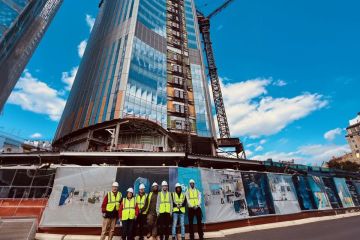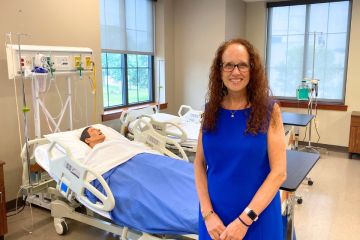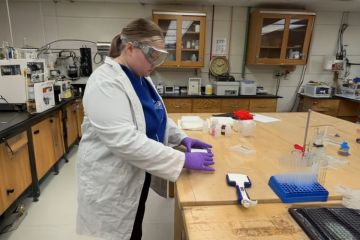Get to Know Lisa Grimm: A Q&A with the new Dean of the College of Arts & Sciences

Widener University welcomed Lisa Grimm as dean of the College of Arts & Sciences on July 1. She comes to Widener from The College of New Jersey (TCNJ) where she served in many roles, including as a member of the faculty, associate dean, and, most recently, interim dean of the School of Humanities and Social Sciences. Grimm is an accomplished scholar in the field of cognitive psychology, and Widener is pleased to welcome her into the Pride.
Welcome to Widener! Tell us a bit about yourself and your background.
I grew up in northern Virginia outside of Washington, D.C and have one sister, who is now an endocrinologist. My dad worked as a lawyer for the Legislative Council for the House of Representatives and my mother, who majored in piano performance in college, taught piano out of our home. They both grew up in the midwestern part of the U.S. and so my childhood was an interesting combination of politics, attending symphony concerts at the Kennedy Center and plays at various playhouses, and an instilled midwestern ethos of hard work and the importance of family. I played the piano starting at a young age, the clarinet, and the oboe. I also loved soccer and played from age five into college; I played for Grinnell College. My husband and I met in graduate school at the University of Texas at Austin, where we both earned doctoral degrees in cognitive psychology. He now works for the Federal Aviation Administration. And, last, but not least, we have two wonderful children who are both in middle school next year.
What made you interested in coming to Widener?
From the moment that I saw the position posted, I could tell that Widener would be a perfect fit for me. I appreciate the emphasis on being agile with the strategic vision ‘Agility Experienced’ that is paired with an emphasis on student success and belonging. It was clear to me that it is universally recognized that student success is at the heart of the institution and that students are viewed holistically. During the interview process, I was also impressed by the sense of community and care for community members that is evident at every level of the institution starting with President Stacey Robertson, and Provost Andy Workman and the other administrators, staff, and faculty leaders. Having now worked at Widener for a couple of weeks, I am happy to report that these initial impressions match my lived experience. I have been surrounded by wonderful people who care deeply about students and each other, and I am looking forward to the return of the faculty and students to start the fall semester.
What do you hope to accomplish as Dean of the College of Arts & Sciences?
My vision for the College of Arts & Sciences is very simple. I want to continue to nurture and support a community where everyone feels that they belong, are cared for, and have a voice. One of my early initiatives will be to create a Dean’s Student Advisory Council to make sure that I am directly connected to students, to problem solve and to support ideas for initiatives that come from students themselves. I am also excited to build relationships with alumni and community partners to support a College of Arts & Sciences Advisory Board to create synergy between local and industry needs and academics, but also to support opportunities for students.
Nationally, from an academic perspective, we are still recovering from the aftermath of the COVID pandemic. Students are coming to college with different needs and so I will be focused on how to support faculty as they continue to manage demands in the classroom and do what I can to alleviate some of the exhaustion and feelings of burnout resulting from the accumulated strain. The Widener faculty are deeply committed to student success as demonstrated by their effort and dedication, and I will work with the administration and staff to continue to provide them with resources.
So many students, regardless of major, take classes in the College of Arts & Sciences. How do these classes contribute to a well-rounded academic experience for students?
I realize that I am biased but there is nothing more important than taking classes in the liberal arts and sciences! These classes teach students about being human - our shared history, our literary and artistic traditions, and our linguistic and cultural experiences. Students also solidify their understanding of scientific reasoning and develop the mathematical skills to engage with real-world problems. It is the combination of all these experiences, paired with a concentrated study within their major, that not only allow students to develop the capacity to be life-long learners and to prepare them to switch jobs as the workforce needs change, but also to become agents of change.
Your background is in cognitive psychology. Can you tell us what drew you to the field and a bit about your research areas?
I did not originally have any interest in psychology. I didn’t take AP Psychology in high school, and I attended college thinking that I would go to medical school. I took psychology in college my first semester only because I was closed out of taking the first biology course – as an aside, my experience of registering for first semester classes was waiting in a long line outside while senior students threw water ballons at us from the roof of a dorm only to get inside to run around to tables as fast as possible to physically write my name down on the class rosters before they filled up. I am glad that technology has significantly improved the experience for students today!
So, I took psychology in my first semesterand I loved the concept of research. I hadn’t been exposed to the idea before that I could learn about the mind and its processes by collecting data. I approached the chair of the psychology department the next semester and he sponsored my first independent research project.
From that point forward, I started building an interdisciplinary path where I completed research in behavioral, cognitive, and social psychology, and studied philosophy of the mind during my semester abroad at the University of Stirling in Scotland. I was fortunate to have a spectacular graduate advisor, Dr. Art Markman, who let me explore classic areas of cognitive psychology (like classification and similarity processing) but also allowed me to write a dissertation on the cognitive impact of stereotypes.
My research as a faculty member, in collaboration with my students in the Motivation, Individual Differences, and Stereotypes in Cognition (MISC) Lab at TCNJ, focused on the idea that human cognition does not occur in a vacuum. Our goals, beliefs, and social roles influence the way we remember and use information. My research considers how these factors interact with learning and testing environments to influence performance in a wide range of domains, such as video game play/design, exercise, language learning and programming, and even magic.
As an educator, scholar, and now dean, we can imagine your days are busy! What do you like to do in your free time?
I am a bit eclectic in my hobbies! As a result of my musical upbringing, I enjoy playing the piano and still occasionally play the oboe. I am also fulfilling a life-long dream to learn to play the bagpipes – I am very grateful to my family for tolerating this hobby as I have learned to play the fireside pipes (a small version of the highland bagpipes) over the last couple of years. I also love cooking and the outdoors - and so enjoy gardening, and spending time with my kids skiing in the winter and hiking in the summer. My husband and I (and our kids) also enjoy playing video games. Since we started dating many years ago, my husband and I have jointly played games - passing the controller back and forth. We are currently playing the Horizon series (Horizon Zero Dawn and Horizon: Forbidden West).



